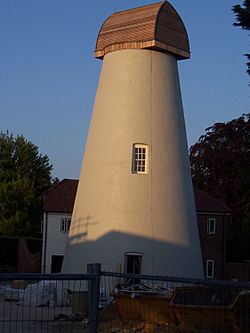Bidborough Windmill facts for kids
Quick facts for kids Bidborough Windmill |
|
|---|---|

Bidborough Windmill, June 2006
|
|
| Origin | |
| Grid reference | TQ 562 435 |
| Coordinates | 51°10′8″N 0°13′55″E / 51.16889°N 0.23194°E |
| Year built | 1858 |
| Information | |
| Purpose | Corn mill |
| Type | Tower mill |
| Storeys | Four storeys |
| No. of sails | Four |
| Type of sails | Patent sails |
| Windshaft | Cast iron |
| Winding | Fantail |
| Fantail blades | Six blades |
| Auxiliary power | External engine |
Bidborough Mill is a special old building in Bidborough, Kent, England. It's a type of windmill called a tower mill. Today, it's not grinding grain anymore. Instead, it has been turned into a house! It's even a "Grade II listed" building, which means it's important and protected because of its history. You can find it in a place called Mill Court, near Penshurst Road.
Contents
The Story of Bidborough Mill
How Old Is It?
It's a bit of a mystery exactly when Bidborough Mill was built. Some records from the 1700s mention flour being bought for people in need, which suggests there was a mill nearby. A map from 1769 also shows a mill. So, it might be an old mill from the 1700s, or perhaps a new one built in 1858 to replace an even older one.
What Did It Do?
This windmill was used to grind flour from grain. In the 1890s, it even worked with a watermill in a nearby village called Speldhurst. The mill had four large "patent sails" that caught the wind.
When Did It Stop Working?
Around 1900, something big happened: the mill was hit by lightning! This damaged two of its sails. After that, the mill stopped working, and the other two sails were taken off a few years later. There was an idea in the 1930s to put a different kind of wind pump on it, but that never happened.
What Happened Next?
In 1942, during World War II, the top part of the mill (called the cap roof) and the main shaft that held the sails were blown off. A new cap was made in 1949, but later it was replaced with a flat roof.
The Mill Today
In 2006, the old mill was changed into a home. A new, special cap was made to look like the original one, and it was put on the mill on May 1, 2006. So now, this historic windmill is a unique house!
How Bidborough Mill Worked
What It Looked Like
Bidborough Mill is a four-storey building made of brick. Some parts of it are covered with cement. It used to have a special "Kentish-style" cap on top. It also had four large "patent sails" to catch the wind.
Catching the Wind
To make sure the sails always faced the wind, the mill had a "fantail". This was a small set of blades on the back of the cap that would automatically turn the cap so the main sails were always in the best position.
Grinding the Grain
Inside, the mill had large millstones that would grind the grain into flour. These stones were driven from below.
Extra Power
Sometimes, the wind wasn't strong enough, or the mill needed more power. So, there was a large wheel on the outside of the mill. This allowed a traction engine (like an old tractor) to connect with a belt and help power the mill's machinery. Before it was turned into a house, you could still see some of the old equipment inside, like a machine that cleaned wheat and another that made the flour finer.
Images for kids


